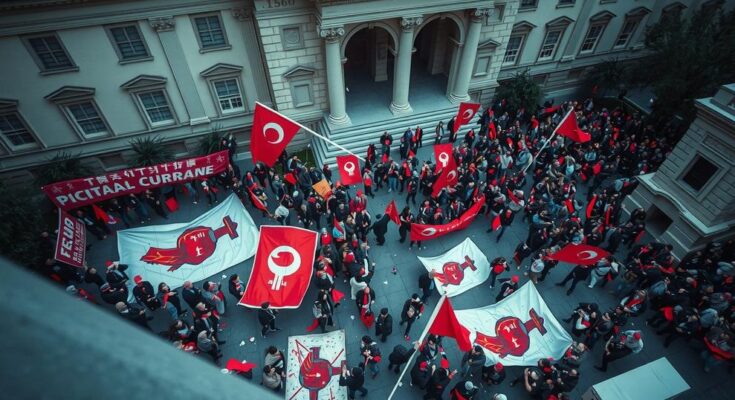On March 12, 2025, pensioners took to the streets outside Argentina’s National Congress in Buenos Aires seeking better pensions and access to free medicines. This demonstration was joined by soccer fans and groups known as “barra bravas,” which have a history of violent behaviour. Some protestors resorted to violence, leading to injuries among both demonstrators and police. Authorities reported that 25 people were hurt during these clashes.
Human Rights Watch has raised concerns regarding the excessive force used by security forces to quell the protests. The organisation’s Americas director, Juanita Goebertus, has called for government accountability rather than vilification of judicial decisions made concerning the protests. They stress that members of security forces acted in a reckless manner, necessitating a thorough investigation into their actions.
Evidence compiled by Human Rights Watch, including videos and photos from the protest, shows a member of the National Gendarmerie firing a tear gas cartridge directly at a journalist, causing a severe head injury. This was showcased during a live broadcast, evidencing the dangerous use of force without adherence to international guidelines on tear gas deployment.
Additional footage reveals security forces firing tear gas at protesters from dangerous horizontal angles, endangering numerous individuals, while also observing the deployment of high-pressure water cannons on non-violent demonstrators. Goebertus pointed out that the government should review its “anti-protest” protocol, which sanctions such aggressive responses and creates room for misuse by police.
Among the protests, some demonstrators attacked police and journalists, resulting in injuries to 14 officers. Despite these incidents, many protesters were arrested arbitrarily without clear explanations. A local judge declared the arrests unlawful, prompting criminal complaints against him from the Security Ministry for obstructing official duties.
The government’s subsequent actions highlight a trend toward criminalising dissent, as they filed complaints regarding alleged sedition against protest organisers, including union leaders. This broad definition of sedition risks stifling free speech and disproportionately punishing critics of the government.
In a contradictory move, Security Minister Bullrich confirmed that no investigation into the police’s role following the protests would take place, commending their actions as protective of democracy. Meanwhile, an internal conflict within the judiciary has stalled investigations into the security forces’ conduct, undermining accountability efforts. Human Rights Watch urges Argentine authorities to address these concerns urgently, ensuring protective measures for citizens’ rights in the face of protests.
On March 12, 2025, pensioners protested in Buenos Aires for better pensions and healthcare, joined by soccer fans. Despite some violence from protesters, Human Rights Watch condemned the excessive force used by security forces, particularly the reckless deployment of tear gas. The government’s ‘anti-protest’ protocol has raised serious concerns about free speech and accountability for law enforcement. The situation highlights a troubling trend in how dissent is managed in Argentina.
In summary, the events surrounding the protests on March 12, 2025, showcase a concerning pattern of governmental responses to civil dissent in Argentina. With evidence of reckless force used by security forces, a problematic ‘anti-protest’ protocol, and implications for judicial independence, the situation necessitates a robust review and accountability measures. Human Rights Watch advocates for urgent investigations into the excessive use of force and the safeguarding of citizens’ rights amidst escalating tensions. The vulnerability of pensioners and critics in the face of violent responses reflects broader issues in how freedoms are protected under current governance. The integrity of Argentina’s democracy depends on upholding the right to protest while ensuring the responsible actions of law enforcement.
Original Source: www.hrw.org



